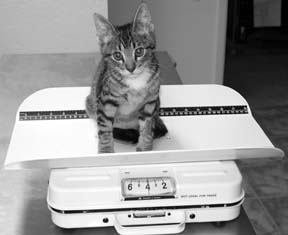
288
The holidays are over, and like most people, you may want to resolve to do a few things better in the New Year. Dont forget your cat! Let the New Year ring in some feline resolutions geared to improve your cats daily life and health.
You already provide lots of love, fresh water and a healthy diet, of course, but dont stop there. Here is a roundup of simple ways to make your cats life better in the New Year, along with a few tips that are just plain fun for your cat.
Give the gift of health. Make a veterinary appointment for your cat during January or February, and ask your veterinarian to run some basic tests such as a blood count, a blood profile to check organ function, a urinalysis and a blood pressure check, says Jane Brunt, DVM, founder and owner of CHAT (Cat Hospital At Towson) in Baltimore, Maryland. If everything is normal, thats wonderful news and you have a baseline for future comparison, she says.
Look for a veterinary hospital with a strong emphasis on wellness care that includes prevention of both medical and behavioral problems, says Ilona Rodan, DVM, of the Cat Care Clinic in Madison, Wisconsin. Preventing medical problems includes dental health, parasite control and nutritional counseling, while behavior problem prevention covers litter box information, socialization, training suggestions and environmental enrichment to deter boredom and undesired behaviors.
Improve her diet. Forty percent or more of pet cats may be overweight, predisposing them to problems like diabetes and arthritis, according to Dr. Brunt.
Newer information on feline nutrition is focusing on the problems related to high carbohydrate feline diets (grain-based dry foods), she says.
Before changing your cats diet, consult a veterinary expert. Any dietary change should be made with a veterinarians guidance, and changes are best made gradually over several weeks, Dr. Brunt advises.
While cats dont usually get bored eating one type of food, its a good idea to put a little variety in their diet. A cat who experiences only one shape and size of kibble may be unwilling to change his diet if health or availability issues arise that warrant a dietary adjustment, Dr. Rodan explains. Most veterinary nutritionists recommend feeding a cat at least two brands of food from two different reputable companies, she says.
Find time to play. Resolve to set aside a minimum of 10 to 20 minutes twice a day to play with your cat, Dr. Rodan recommends. As our lives get busier, taking time to enjoy and love our feline companions – and to smile and laugh at their funny antics – is mentally healthy for both you and your cat, she says.
Variety is the spice of life, so introduce new toys regularly and alter their locations, Dr. Brunt says. Try dangling a feather on a stick or a use a laser pointer if your cat likes to chase the light, she suggests. Other popular interactive games include dangling toys on elastic strings (be sure they remain firmly attached at both ends) and chasing balls inside circular tracks.
Groom and bond with your cat. A daily gentle brushing or combing – especially beneficial to older cats that have trouble grooming themselves – stimulates your cats blood circulation, adds luster to her coat and removes loose hairs that might otherwise contribute to a hairball. Regular grooming can also help you catch flea problems early. Best of all, sharing your cats grooming duties can help her feel closer to you.
Solve a behavior problem. Scratching helps your cat stretch muscles and groom claws, but if his favorite scratch zone happens to be your expensive sofa, try the following: Keep your cats nails trimmed weekly, Dr. Brunt says. Always provide at least one scratching post, and consider using different kinds – rope styles, fabric, wood or cardboard – to find the scratching surface your cat prefers. Reward him for using the new post, and place double-stick tape on inappropriate surfaces to discourage scratching.
Litter box indiscretions, while common, should never be ignored. Several medical problems can lead to avoidance of a litter box, Dr. Rodan says. Since some of these can be serious and painful, its important to seek veterinary attention and treat any underlying medical issues, she emphasizes. (See related article on page 4 of this issue.)
Offer a kitty treat or comfort item. Create your own food puzzle from a two-liter plastic bottle by punching holes large enough for kibble to fall through when the container is rolled, or hide kibble around the house. The idea is to keep your cat busy, and prevent overeating and obesity, Dr. Rodan says. Its similar to how cats eat in the wild, when they must hunt much of the day to get their nutrition, she explains.
In addition, catnip for catnip lovers, comfortable resting areas (preferably in the sun), along with lots of attention and entertainment, can add comfort and pleasure to a cats daily life, Dr. Rodan says. Its just some of the things you can do to make the most of the New Year for your cat.



